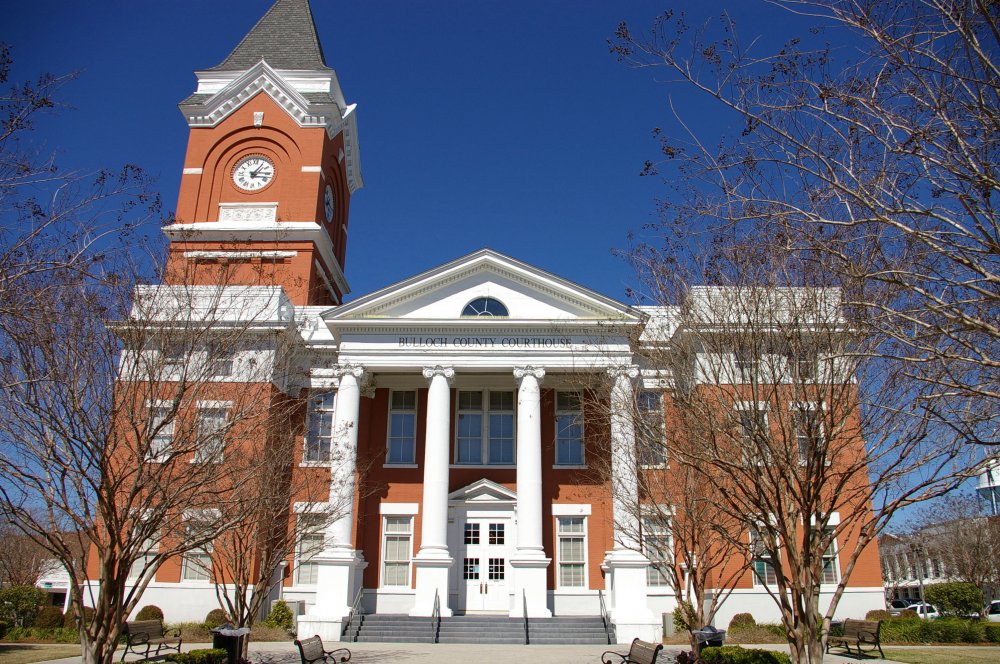
Two members from an activist group appeared before the Bulloch County Commissioners Tuesday to request that the county approve a motion to display multiple historical documents, including the Magna Carta and the 10 Commandments, in the courthouse in Statesboro.
Lynda Brown, a board member from ‘Ten Commandments Georgia’ organization – a group run by Baptist activist Mike Griffin-, was on the agenda to make her presentation which requested that historical archive copies of the following nine documents be prominently displayed:
- Bill of Rights
- Declaration of Independence
- Preamble to the Georgia Constitution
- Lady Justice
- The Magna-Carta
- The Mayflower Compact
- The National Motto
- The Star Spangled Banner
- The Ten Commandments
Brown said the group’s purpose is to ‘restore moral order in communities, the state,and the nation.’ Brown said the Georgia General Assembly, in 2006, directed the Division of Archives and History to “encourage the study of historical documents. She said the General Assembly, at the time, said the courthouses were ‘ideal locations’ to display the documents. The state law, which was amended in 2012, provides that municipal subdivisions of the state ‘shall be authorized’ to post historical documents advocated for by the organization.
The set, Brown said, totals $1,200, but she said a Bulloch County resident contacted her and made a donation to the cause and requested she appear before Commissioners, so there would be no cost to the county or the taxpayers to display the documents. She said roughly one-third of Georgia’s 159 counties currently have the full set of nine documents displayed in the county courthouses. (The map of the counties approved is linked here). Near Bulloch, Tattnall and Jenkins are the only neighboring counties which display all nine.
and made a donation to the cause and requested she appear before Commissioners, so there would be no cost to the county or the taxpayers to display the documents. She said roughly one-third of Georgia’s 159 counties currently have the full set of nine documents displayed in the county courthouses. (The map of the counties approved is linked here). Near Bulloch, Tattnall and Jenkins are the only neighboring counties which display all nine.
Commissioner Anthony Simmons said he doesn’t have a problem with the idea and said he thought it was a “good idea.” Commissioner Jappy Stringer asked county officials if the county already had documents displayed.
County Manager Tom Couch said a few of the documents are displayed and he offered a legal perspective, suggesting that another group of another faith could come forward and request their documents be displayed as well.
“While the law may support this, as you know, we live in a very, well, we live in a community with very robust and different views. If there was another group of individuals that did not want, or let’s say they didn’t want the 10 commandments displayed but they wanted something displayed of their own faith or principles that may conflict with the 10 Commandments, I think we’d have to give them the same consideration,” Couch said.
Brown disagreed and said “This is state law. What they would have to do is get it passed by the state legislature and signed by the Governor. And that’s what we did here. It’s a process.”
County Attorney Jeff Akins suggested cautious movement on the issue because posting the documents would ‘create a public forum’ and would be open the door for anyone to request historical documents be published.
“Actually, that’s not entirely true,” Akins said to Brown’s statements to Commissioners. “Because we’re dealing with a public forum, once you create a public forum, then there doesn’t have to be a state law that would allow something to be placed. I’m not necessarily saying we don’t need to do this, but I think we need to do some research on it and see what all the implications are.” He echoed that documents displayed as a historical display do not violate the “establishment clause” of the First Amendment.
Brown argued to Commissioners and Akins that the state law protects the counties from liability and permits the documents to be posted. “It is historical. Our country was founded on Christian principles,” she said. “The law does say that it is constitutional.”
“I would disagree with you,” Akins told Brown. “The state law can’t declare something constitutional. That would have to be tested in the courts. All I’m saying is that a state statute does not make something constitutional that would be unconstitutional. The law may be fine. Maybe we need a county policy.”
Brown said no county before which she appeared had declined to post the documents.
Couch said, “If we display your documents, we have to, for lack of better term, give equal time to others. We just want to let you know that if that occurs, if something offensive to your documents was presented, you would know why we were impugned to do that.”
Brown simply said, “They’re not my documents. They’re our documents. They’re American documents.”
Commissioners did not take action on the request Tuesday.
Jessica Szilagyi is a former Statewide Contributor for AllOnGeorgia.com.

1 Comment
Leave a Reply
Cancel reply
Leave a Reply

Chattooga Lifestyle
Clean Feeders Save Birds

Chattooga Local Government
Resolution Introduced Urging Accountability for Federal Immigration Detention Facilities
Chattooga Local News
Gesundheit! Here’s how to keep the sneezes to a minimum as pollen counts rise

Bulloch Public Safety
03/04/2026 Booking Report for Bulloch County

Bulloch Public Safety
02/09/2026 Booking Report for Bulloch County

Bulloch Public Safety
02/16/2026 Booking Report for Bulloch County

Bulloch Public Safety
02/20/2026 Booking Report for Bulloch County

Bulloch Public Safety
03/02/2026 Booking Report for Bulloch County

Bulloch Public Safety
02/17/2026 Booking Report for Bulloch County







Brian Westley
January 17, 2019 at 1:43 am
Just more selfish Christians who want to pee their god all over everyone else.